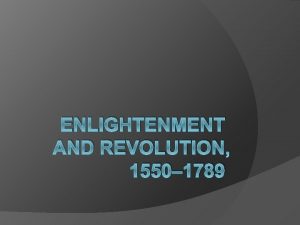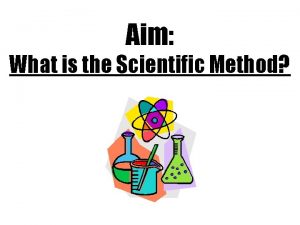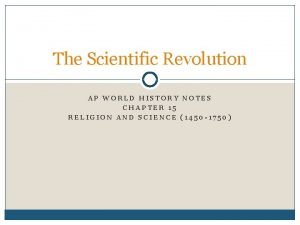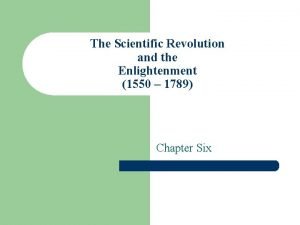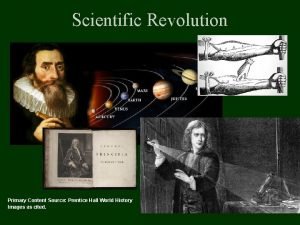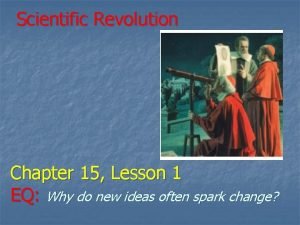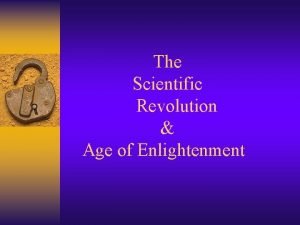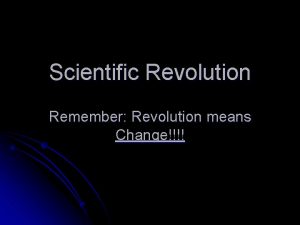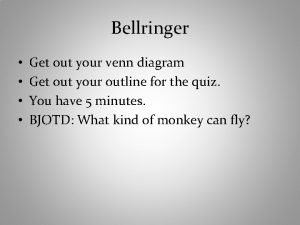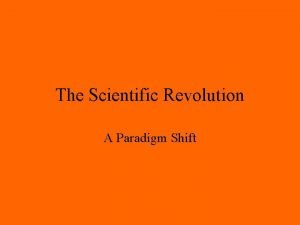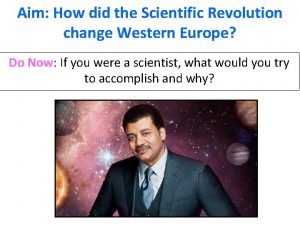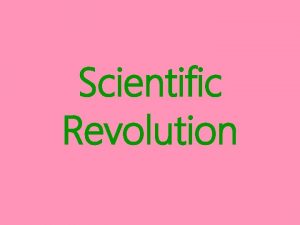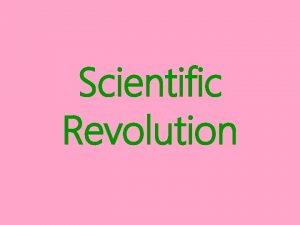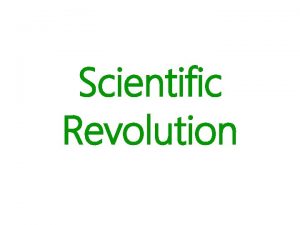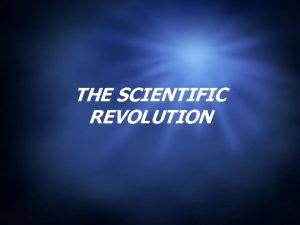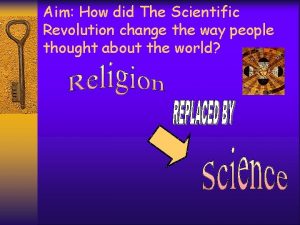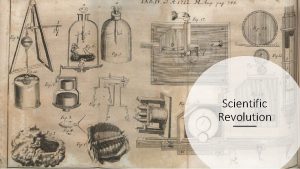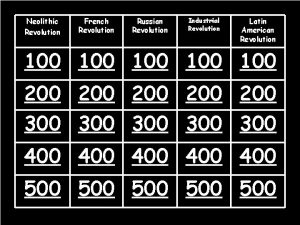Aim How did the Scientific Revolution change Western
















- Slides: 16

Aim: How did the Scientific Revolution change Western Europe? Do Now: If you were a scientist, what would you try to accomplish and why?

I Science and the Middle Ages A) During the Muslim Golden Age, scientific experimentation was encouraged! They invented algebra, a vaccination for smallpox, and studied astronomy (the stars). B) In Medieval Western Europe, true science was rare. The exception were alchemists (they tried to change ordinary metals into gold), but they had to often hide their experiments from the Church, who discouraged scientific inquiry.

II Influence of the Renaissance The Renaissance (15 th – 16 th centuries) led to the Scientific Revolution. A) Humanism encouraged individual achievement, and knowledge of Classical civilizations (Greek and Roman). B) The printing press spread new knowledge C) People began to question the Catholic Church

III The Earth vs. The Sun A) In the middle ages, the Church endorsed the Geocentric Model of the universe. - First believed by Ptolemy, an ancient Athenian astronomer - The earth is the center of the universe

The Earth vs. The Sun Continued… B) 1453 Nicolaus Copernicus , an astronomer and mathematician, proposed the Heliocentric Model of the universe. He argued that the sun, not the earth, is the center of the universe.

The Earth vs. The Sun Continued… Tycho Brahe (1546 – 1601) observed the movements of stars and planets every night for years, and recorded the data. His assistant, Johannes Kepler (1571 – 1630), used Brahe’s data to prove that Copernicus’s Heliocentric model was correct. Johannes Kepler Why do you think that Brahe and Kepler wanted to gather more evidence? Wasn’t Copernicus’s findings enough? Tycho Brahe

IV Galileo (1564 – 1642) A) In 1609 Galileo Galilei invented a refracting telescope, which allowed him to magnify celestial objects up to 30 x their size. B) He was the first to observe 4 moons of Jupiter, and mountains on our moon. This added to the evidence of Brahe and Kepler that Copernicus was right! C) In 1633 Galileo was tried before the Inquisition for heresy. He was forced to recant (take back) his discoveries and to live under house arrest.

Jupiter and its 4 Largest Moons Today scientists estimate that Jupiter has 60+ moons! Io (far left) is the most volcanic place in our galaxy. Europa (center left) has a surface made of water ice. It is possible that a liquid ocean of water is under the ice… is there life there?

Primary Sources: Galileo Galilei 1. “I do not feel obliged to believe that the same god who has endowed us with sense, reason and intellect has intended us to forgo their use. ” – Galileo Galilei 2. …The proposition that the Sun is the center of the world and does not move from its place is absurd and false philosophically and formally heretical, because it is expressly contrary to Holy Scripture. – Trial of Galileo, June 1633 1. What does Galileo mean by quote #1? Do you agree or disagree? Explain. 2. According to quote #2, why did the Church condemn Galileo? 3. If you were Galileo, what would you have said in your defense?

V Isaac Newton A) Newton discovered the force of gravity is what keeps the planets in orbit around the sun. B) Newton is also credited with inventing calculus. Liebnitz Newton Many historians believe that Gottfried Leibnitz actually invented calculus before Newton, and that Newton stole the credit!

A Black Hole, Gravity at its Finest!

VI Other Discoveries from the Scientific Revolution Scientist Leeuwenhoek Discovery ü Perfected the microscope. Was the first to see microorganisms. Robert Boyle ü The first recognized modern chemist. He argued for the scientific method, and that all matter consists of tiny particles. Priestly and Levoisier ü Discovered the existence of oxygen.

VII Scientific Method Over time, a step-by-step process of discovery developed that became known as the scientific method.

VIII Philosophy and the Scientific Revolution Philosopher Rene Descartes Their Philosophy ü Believed in the free will of man. “The supreme perfection of man is that he acts freely or voluntarily, and it is this which makes him deserve praise or blame ü “I think therefore I am” Francis Bacon ü He believed that science should be useful, and help those in need.

Summary 1. How was the Scientific Revolution related to the Renaissance? 2. Why did the Church condemn Galileo? 3. List 4 scientists from the Scientific Revolution and their achievements. 4. Is the scientific method always necessary? Explain. 5. Which philosopher (Descartes or Bacon) do you most agree with? Explain.

Key Vocabulary ü Scientific Revolution ü Alchemy ü Nicolaus Copernicus ü Tycho Brahe ü Johannes Kepler ü Galileo Galilei ü Refracting Telescope ü Geocentric Model ü Heliocentric Model ü Scientific Method ü Isaac Newton ü Rene Descartes ü Francis Bacon
 Did american revolution cause french revolution
Did american revolution cause french revolution What did isaac newton do in the scientific revolution
What did isaac newton do in the scientific revolution How did the reformation help spur the scientific revolution
How did the reformation help spur the scientific revolution Aim scientific method
Aim scientific method Russian revolution vs french revolution
Russian revolution vs french revolution Third agricultural revolution
Third agricultural revolution A logical procedure for gathering and testing ideas
A logical procedure for gathering and testing ideas Scientific revolution ap world history
Scientific revolution ap world history Newton's first law of motion
Newton's first law of motion Scientific revolution project
Scientific revolution project Scientific revolution primary sources
Scientific revolution primary sources Lesson 1 the scientific revolution answer key
Lesson 1 the scientific revolution answer key Divine rights of kings
Divine rights of kings Scientific revolution and enlightenment speed dating
Scientific revolution and enlightenment speed dating Causes of scientific revolution
Causes of scientific revolution Scientific revolution and enlightenment speed dating
Scientific revolution and enlightenment speed dating Effects of scientific revolution
Effects of scientific revolution


